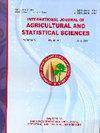Is Increasing Age at Marriage Really Effective in Reducing Completed Fertility? Evidence from the Multinomial analysis of the Fifth Round of the National Family Health Survey in India (2019-21)
IF 0.1
Q4 AGRICULTURE, MULTIDISCIPLINARY
International Journal of Agricultural and Statistical Sciences
Pub Date : 2024-06-01
DOI:10.59467/ijass.2024.20.21
引用次数: 0
Abstract
In accordance with our information, the age at first marriage of women is gradually increasing due to the increase in the level of education, a trend towards employment, and the reduction of social taboos, etc. On the basis of the fifth round of the National Family Health Survey (2019-21) conducted in India, this study examines whether women?s completed fertility is affected by their age at marriage in the presence of all other socioeconomic and demographic factors. The study includes a sample of 44,479 married women over the age of 45 years at the time of the NFHS-5 survey. The trend of completed fertility was examined using descriptive statistics. Bivariate analysis and multinomial logistic regression analysis were employed to show statistical significance. It was found that completed fertility declines gradually with increasing time at all ages at marriage (from NFHS-II to NFHS-V) and with increasing age at marriage in all four rounds of NFHS, completed fertility is reduced. Women who were 35 years and older at the time of marriage [ARRR = 2.619, 95% CI = 2.300, 2.983], who belonged to Hinduism [ARRR = 1.989, 95 % CI = 1.730, 2.287], who belonged to other castes [ARRR = 2.417, 95% CI = 2.120, 2.755], who had higher levels of education [ARRR = 21.424, 95% CI = 10.581, 43.378], who were exposed to mass media [ ARRR = 1.266, 95% CI = 1.158, 1.384], who were living in urban areas [ARRR = 1.266, 95% CI = 1.008, 1.284], and who belonged to the southern region [ARRR = 6.208, 95% CI = 4.923, 7.828] were more likely to have less completed fertility. This study showed that the likelihood of less completed fertility is strongly influenced by the factor of age at marriage.. KEYWORDS :Age at marriage, Completed fertility, Menopause, Likelihood, NFHS.提高结婚年龄真的能有效降低完婚生育率吗?来自印度第五轮全国家庭健康调查(2019-21)多项式分析的证据
根据我们掌握的信息,由于教育水平的提高、就业趋势和社会禁忌的减少等原因,妇女的初婚年龄正在逐渐提高。本研究以印度开展的第五轮全国家庭健康调查(2019-21 年)为基础,探讨了在所有其他社会经济和人口因素都存在的情况下,妇女的完成生育率是否会受到其结婚年龄的影响。本研究的样本包括 44 479 名在 NFHS-5 调查时年龄超过 45 岁的已婚妇女。使用描述性统计对完成生育的趋势进行了研究。采用了二元分析和多项式逻辑回归分析来显示统计意义。结果发现,在所有的结婚年龄(从第二次全国人口与健康调查到第五次全国人口与健康调查),随着时间的延长,完成生育率逐渐下降,而且在所有四轮全国人口与健康调查中,随着结婚年龄的增加,完成生育率也在下降。结婚时年龄在 35 岁及以上的妇女[ARRR = 2.619,95% CI = 2.300,2.983],信奉印度教的妇女[ARRR = 1.989,95% CI = 1.730,2.287],属于其他种姓的妇女[ARRR = 2.417,95% CI = 2.120,2.755],教育程度较高的妇女[ARRR = 21.424,95% CI = 10.581,43.378]。ARRR=1.266,95% CI=1.158,1.384]、生活在城市地区[ARRR=1.266,95% CI=1.008,1.284]和属于南方地区[ARRR=6.208,95% CI=4.923,7.828]的人更有可能完成生育率较低。这项研究表明,未完成生育的可能性受结婚年龄因素的影响很大。关键词:结婚年龄、完成生育、更年期、可能性、NFHS。
本文章由计算机程序翻译,如有差异,请以英文原文为准。
求助全文
约1分钟内获得全文
求助全文
来源期刊
自引率
66.70%
发文量
4
期刊介绍:
Information not localized

 求助内容:
求助内容: 应助结果提醒方式:
应助结果提醒方式:


